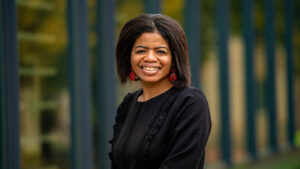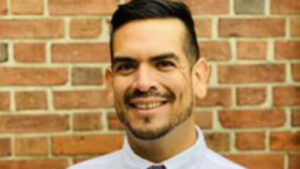CITLS and Counseling Center help prepare us for Nov. 3 and beyond
By Shannon Sigafoos
It goes without saying that our sensitivity to the power of words is heightened during an election cycle. For months, we analyze statements made by candidates, research their political validity through fact-checking, and engage in research and debate watching to determine how we will cast our votes. Which words have been taken out of context? Which have been misattributed, misquoted, or misconstrued? In short, words form the basis of our political leanings, and nearly everyone engages in some sort of discourse or another.

Tracie Addy
With robust political discourse, however, also should come respect, tolerance, and rationality. To that end, the Center for the Integration of Teaching, Learning, and Scholarship (CITLS) and the Counseling Center teamed up to present “Preparing for the Upcoming Election: Respectful Classroom Dialogue” as part of their Inclusive Teaching and Excellence Series. The session was hosted by Tracie Addy, associate dean of teaching and learning. Panelists included Jonathan Asayag, staff counselor and outreach coordinator at the Counseling Center, and Mallory SoRelle, assistant professor at Duke University Sanford School of Public Policy.

Jonathan Asayag
Though the goals of the session included learning recommended practices for facilitating discussions with students during a contentious presidential election and for supporting students who may exhibit stress due to the election, it is safe to say that the stressors caused by the election cycle affect the Lafayette community as a whole. And, the only way to guarantee civil discourse while we are discussing tough, complicated issues is to discourse civilly and with reasoning. “In any setting, how do you talk about this? How do you bring it up? How do you make sure you’re not falling into a problematic discussion that is one side against the other?” Addy shared following the session. “I personally think many of the strategies that were brought up [during the session] can apply in other situations where you acknowledge that this is a contentious election. You acknowledge that there is a lot going on in our political environment right now. And wherever you are—whether you’re talking to your colleague, to a student, or family member—you recognize that, and you are careful about the types of words you use and make sure that you do not get into unproductive discussions that will not be useful for either side.
“We must understand and recognize that we’re all different. We have different political views and we can all have stressors associated with what’s going on right now. That can be for many reasons, whether it’s related to our social identities or concerns about our health, the health of our loved ones, or unrest across the country, among other challenges. You can apply the ideas from the session to many conversations about the election.”
The Counseling Center recently released a guide on maintaining mental health during the election and while we’re all awaiting the results, which also shares tools about navigating difficult conversations about politics and information on virtual workshops and support spaces for students.
“A lot of this is just focusing on self-awareness and considering, ‘How do I get myself to the point of even having the conversation? Who am I going to have the conversation with?’ At the same time, there’s the pressure that folks will put on themselves to know all the facts and statistics to prove the other side wrong. It can feel very draining and overwhelming,” said Asayag. “How comfortable are you having these conversations? How are you taking care of yourself? And if you choose to have these conversations, how do you debrief? Who do you talk to about it?”
It’s also important to acknowledge that we’ve been separated, isolated, and quarantined in the midst of a global pandemic. Many of us physically moved into households and situations where we may not be able to distance ourselves from others who do not share our political beliefs. By simply being aware of the emotions we are experiencing and reminding ourselves that there are no “right” or “wrong” emotions, we also can remind ourselves that others are facing similar feelings and challenges.
“These times are really difficult, and we don’t always have it together or feel like we can handle it,” shared Asayag. “If you’re going to have these conversations, it’s OK to be human.”
If you would like to speak with a counselor during normal business hours, please call the Counseling Center at 610-330-5005.


